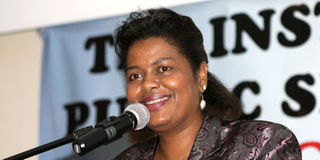Implementing the Constitution may take years, says judge

Supreme Court judge Njoki Ndung'u speaks during the Institute of Certified Public Secretaries of Kenya Annual Dinner at Sarova Panafric Hotel, Nairobi April 4, 2012. She said some clauses in the Constitution are "irrelevant" and might take years before they are fully implemented. EMMA NZIOKA
A Supreme Court judge has conceded that some clauses in the Constitution are "irrelevant" and might take years before they are fully implemented.
Lady Justice Njoki Ndung’u, who was a member of the Committee of Experts who wrote the Constitution, said the Constitution was a politically negotiated document and Kenyans should not expect the Coalition Government to achieve its full implementation.
“It was a Constitution where everyone wanted something leading to some Articles and Clauses being irrelevant and inconsistent,” said Justice Ndung’u during an annual dinner organised by the Institute of Certified Public Secretaries of Kenya (ICPS) at the Sarova Panafric Hotel, Nairobi Wednesday.
She said that writing the Constitution was part of the Agenda Four that came as a result of talks to end the 2008 post-election violence and people should understand the problems encountered in interpreting the Constitution are normal.
Lady Justice Ndung’u said it is impossible to exert pressure on the current Parliament to pass Bills to facilitate full implementation of the Constitution, adding that the only way is to identify priority areas which require urgent legislation.
She said the implementation should not be rushed and subsequent Parliaments can take over the task.
“When we were writing the draft constitution, we realised some clauses in the independence constitution had not been implemented. We should take at least 15 to 20 years to achieve all the dreams of this Constitution,” she said.
The judge challenged the private sector to take up the role of implementing the Constitution by filing petitions in court in order to speed up the process.
She told them that they should also not allow Parliament to take up the role, adding that MPs should only be policy makers but not constitutional interpreters.
“The private sector has left the role to civil society organisations although many of the constitutional provisions directly affect them and are the first to complain when the court makes a constitutional declaration,” said Lady Justice Ndung’u.
She cautioned against the attack on judicial rulings, saying that people need to respect their decisions and that the country cannot operate without the rule of law if everyone was to disagree with every court’s judgment.
On the slow pace of enacting Bills in Parliament, Lady Justice Ndung’u said Kenyans are to blame for electing people who cannot make laws and warned that if the House passes any unconstitutional Bill, the Judiciary will be at hand to advice the executive not to break the law by approving the Bill.
She said that the role of Judiciary in constitutional dispensation will be to keep a check on other arms of government to ensure they do not pass anything unconstitutional.
She warned Counties that not yet prepared for the devolved government, saying that they will not receive any funding from the central government unless they satisfy the provisions set out in the Constitution.
Lady Justice Ndung’u said the Supreme Court is ready to offer any advice concerning the election date and is waiting for any party which will go back to court seeking interpretation.



